There’s no pain quite like losing a child. The silence that follows, the birthdays that never come, the unwrapped presents left behind, it’s unbearable.
But what happens when that pain is eclipsed by something else? A demand. A confrontation. A family fracture so deep, it cuts straight through already-broken hearts.
That’s what happened when a woman’s ex-sister-in-law asked her and her family to pay half the funeral costs for a child they were barely allowed to mourn.
Let that sit for a moment.
The Ask That Sparked Everything
The story centers on a grieving aunt, whose brother had recently lost his daughter. Except, he wasn’t even allowed to be a full part of the funeral. His ex (the child’s mother) planned everything without him. She even listed her new boyfriend as the child’s “daddy” in the obituary. And when it came time to pay the bills?
She expected half the money to come from the man she had excluded.
From the outside, it sounds messy. Inside, for this family, it was heartbreaking and infuriating. How do you process grief when you’ve been pushed aside, and then handed an invoice?
The woman stood up and said no. She offered to cover a third of the costs instead, splitting it between the three adults involved: the mother, the biological father, and the new boyfriend. But her ex-SIL refused. She wanted half, and she wanted it now.
Then came the accusations. Harsh words. Even a claim of fraud over the fundraiser money.
What started as mourning became a moral minefield.
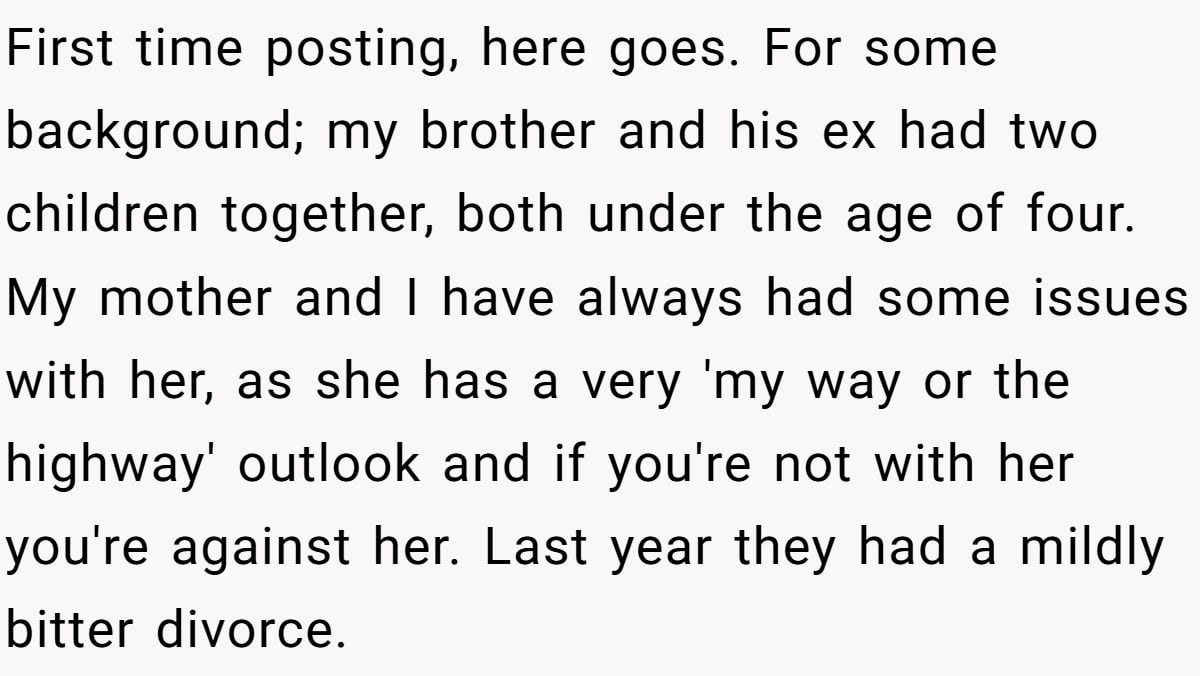
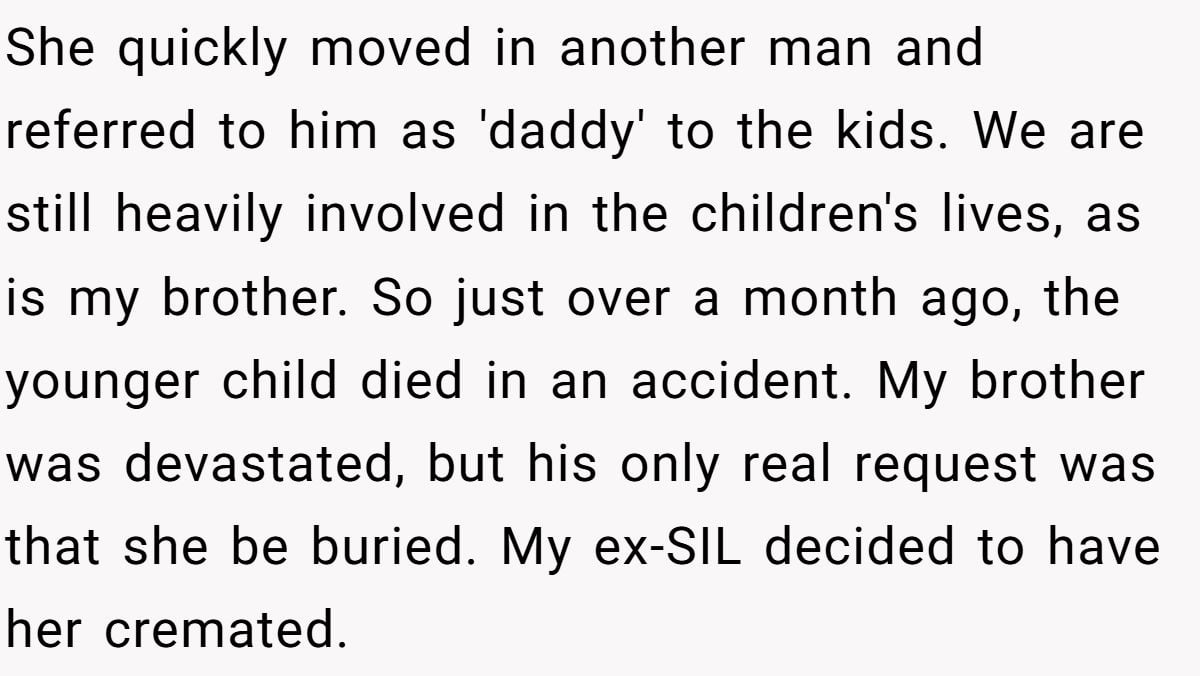
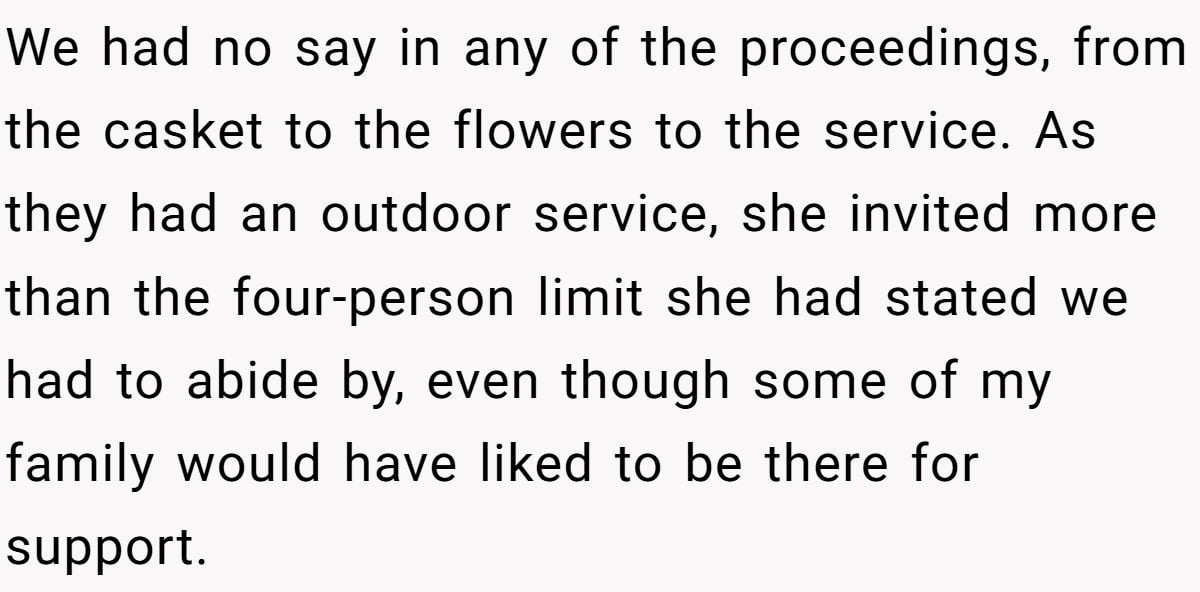
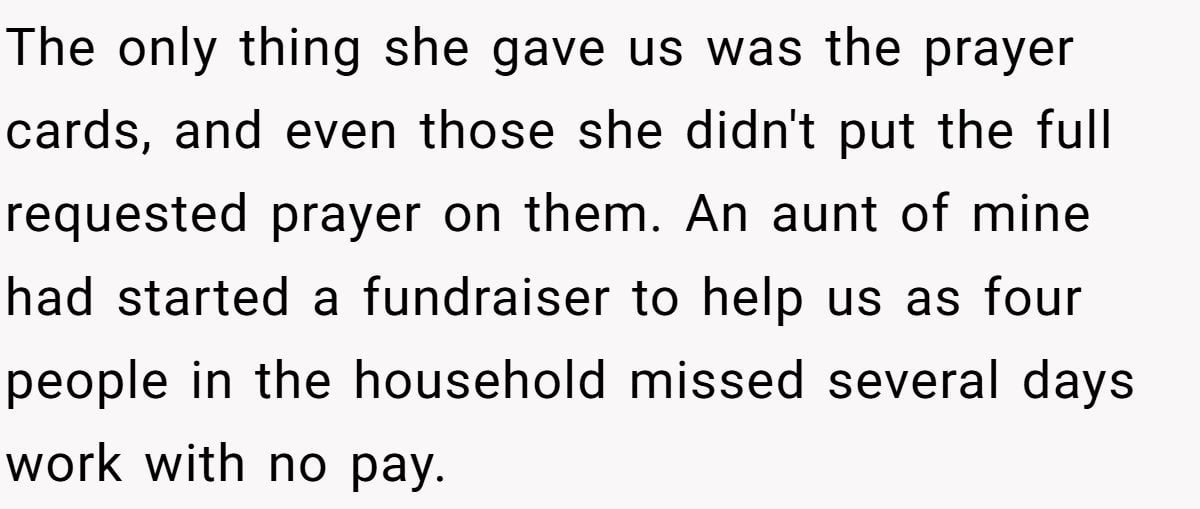
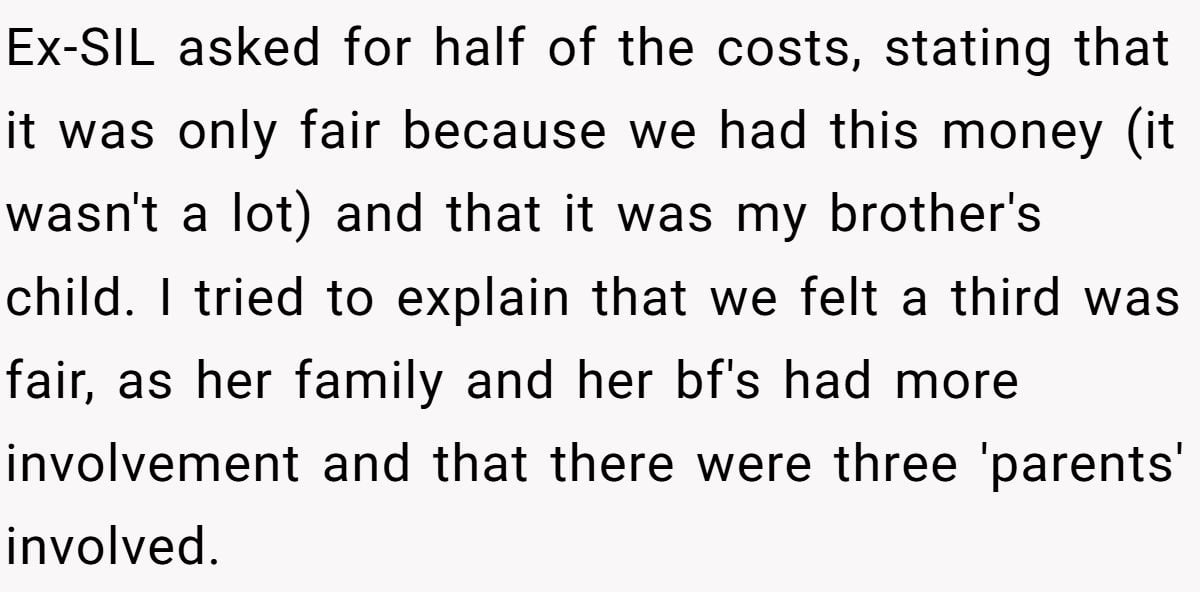
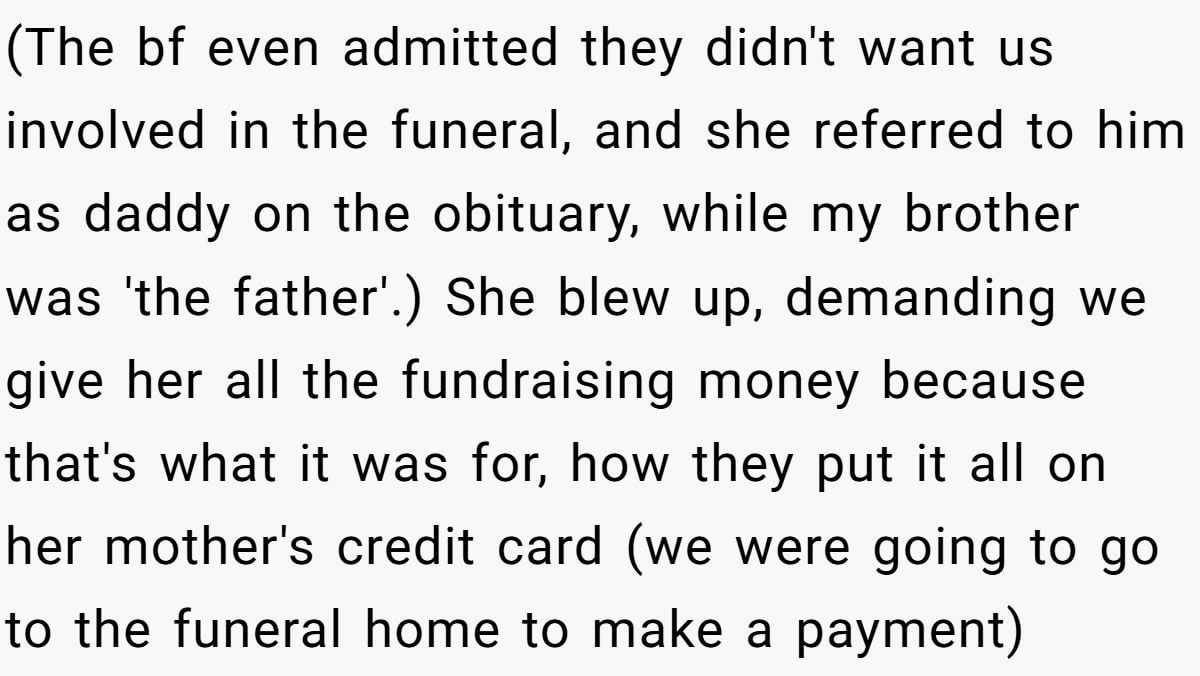
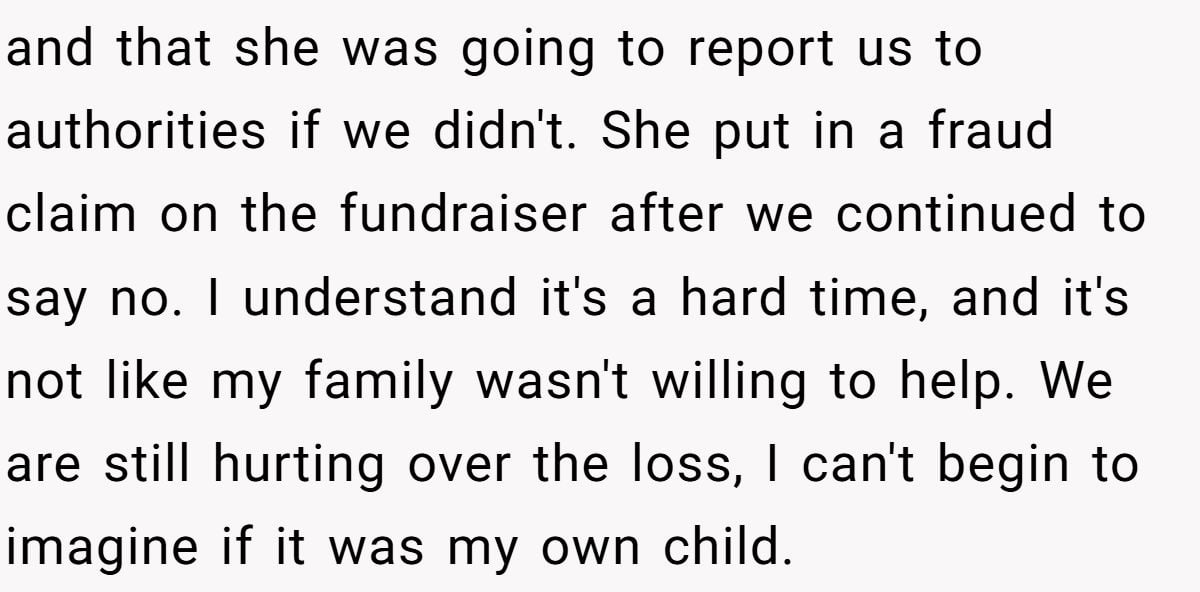

The Real Question
So the woman asked herself, and the AITAH community, something we all hope we never have to consider:
Was I wrong for saying we shouldn’t have to pay half?
It’s not about money on the surface. It never is, in cases like this. It’s about being seen, heard, and respected in times of loss. It’s about fairness when emotions are already frayed and raw.
This wasn’t just a financial dispute. It was a fight for dignity and recognition.
When Emotions Are High, Logic Goes Quiet
Grief doesn’t just show up with tears. It often arrives tangled up with resentment, guilt, anger, and sometimes, money.
What this family experienced wasn’t just a clash over dollars. It was a clash over power, place, and pain. When someone is grieving, any slight, real or perceived, can feel like betrayal. And in this case, the wound ran deep.
Let’s be clear: being asked to help pay for a child’s funeral you weren’t allowed to help plan is not a simple “yes or no” moment. It forces you to choose between compassion and boundaries.
This woman didn’t want to make things harder. But she also wasn’t going to write a blank check while being shut out of the process completely.
Left Out of Grief, Then Handed the Bill
Here’s the part that made this especially painful: the child’s father was excluded from the burial planning. His input was ignored. His attendance at the service was limited. And in a move that felt like a slap, his ex listed her new partner as “daddy” in the obituary.
Imagine seeing your child’s farewell rewritten, your presence erased, and then being asked to split the cost.
That’s not just unfair. That’s deeply hurtful.
And it’s not about being “stingy.” It’s about being respected in the midst of unimaginable loss.
The Money Trail
The ex-SIL’s demand didn’t come with transparency, either. She claimed she’d racked up funeral expenses on her mother’s credit card, and insisted that the father’s side pay half. But she also wanted all the fundraiser proceeds, without input from the other side of the family.
It wasn’t just the ask. It was how she asked.
And when the aunt offered a third of the costs, a fair split between all three adults involved, it was rejected.
Then came the fraud accusation.
Instead of grieving together, they were now locked in a standoff over who owed what, and whether the woman’s refusal to pay half made her the villain.
Grief Experts Weigh In
Dr. Pauline Boss, a psychologist known for her work on ambiguous loss, once said,
“Grief can fracture families when communication breaks down, especially in blended or estranged dynamics.”
That quote feels like it was written for this exact situation.
When one side takes total control while pushing the other aside, grief becomes a battlefield.
And sadly, it’s not rare.
A 2023 study by the Grief Recovery Institute found that 1 in 4 families experience serious conflict over funeral expenses. It’s one of the most common sources of family fights during times of mourning.
Why? Because money becomes a stand-in for power, inclusion, and respect.
The Offer That Wasn’t Enough
In the middle of this grief-fueled fallout, the woman tried to find a middle ground.
She offered to cover a third of the funeral costs, divided evenly between the three adults involved in the child’s life:
- the biological mother
- the biological father
- and the mother’s new boyfriend, who had been elevated to “daddy” status in the obituary.
That offer wasn’t random. It was based on logic, involvement, and emotional equity. Her thinking was simple:
“If you treated my brother like he didn’t exist, why should we be expected to pay like he was fully included?”
But instead of meeting in the middle, her ex-SIL doubled down. She rejected the offer and demanded half. And when the family refused? That’s when she claimed fraud over the fundraiser money.
It stopped being about grief and became a tug-of-war over control.
What Reddit Had to Say
The AITAH community responded with a flood of comments, and most weren’t subtle.

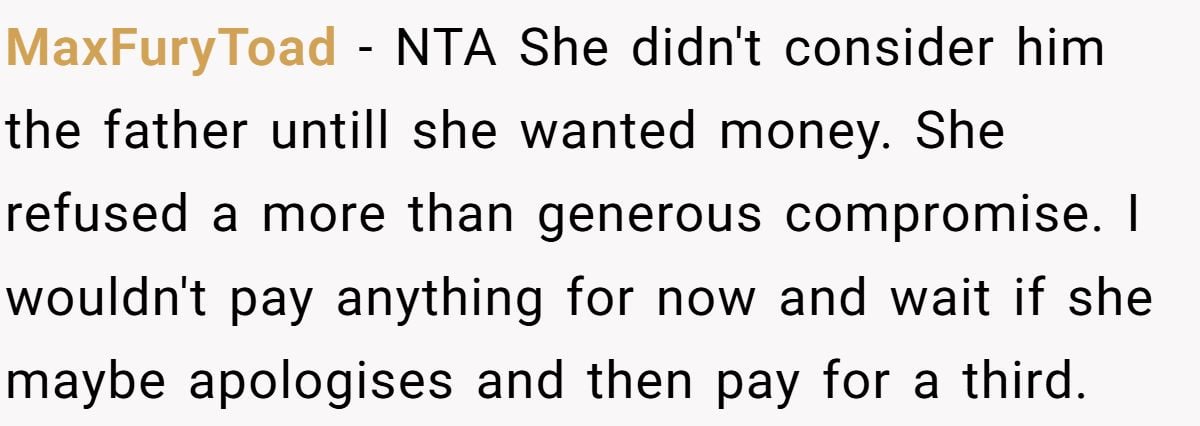
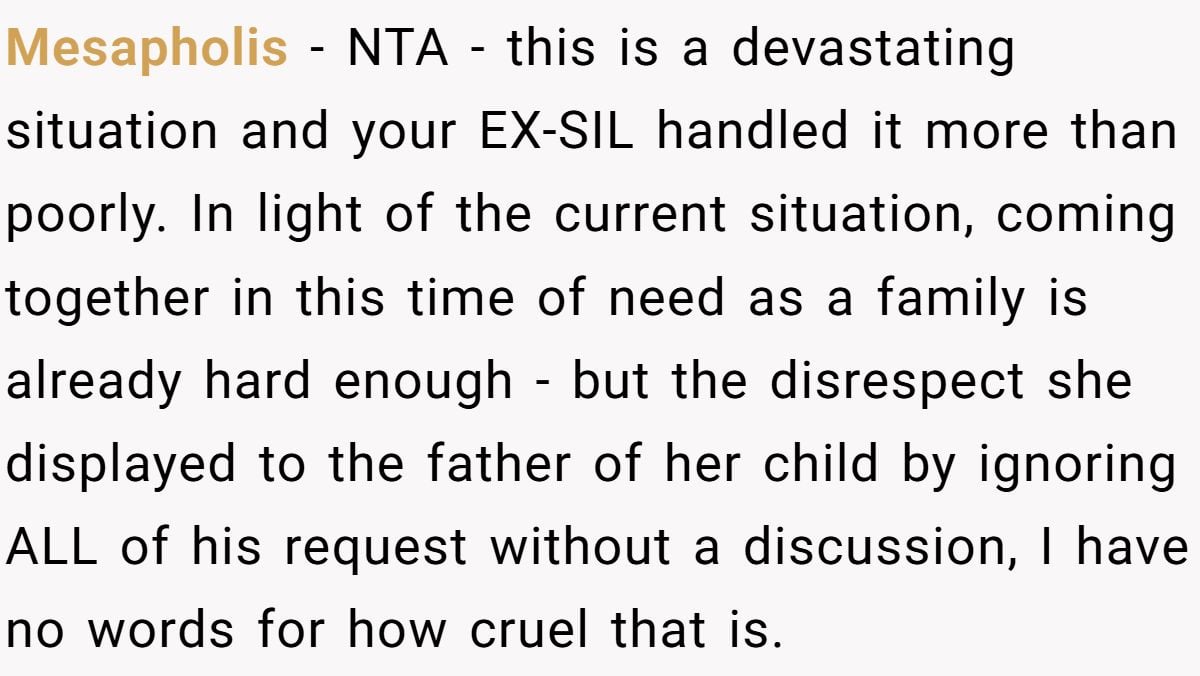
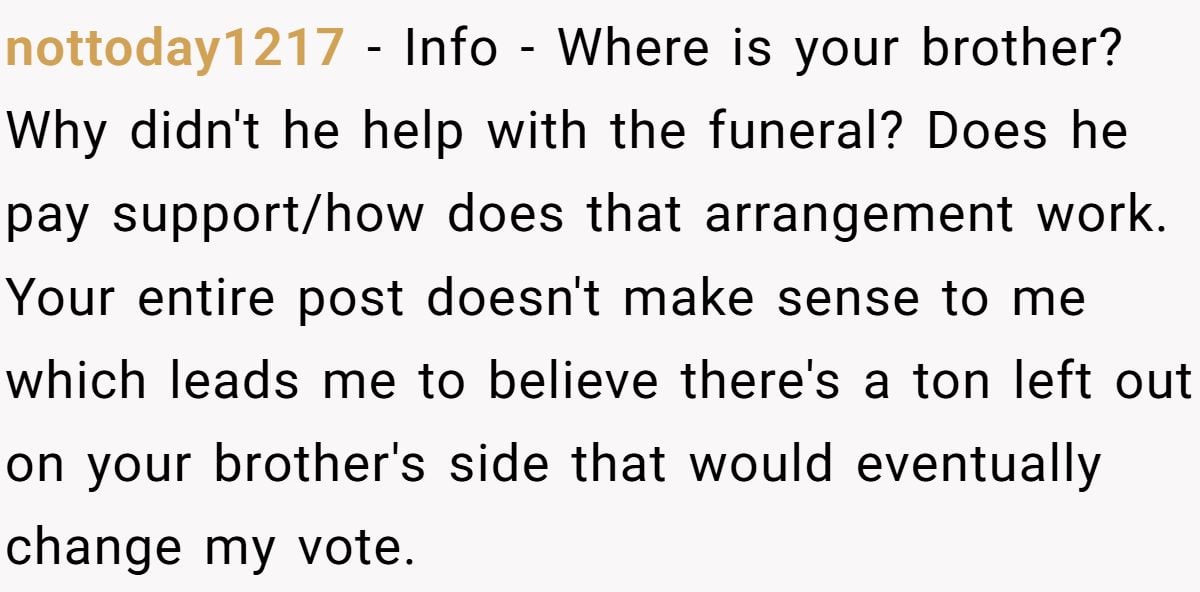
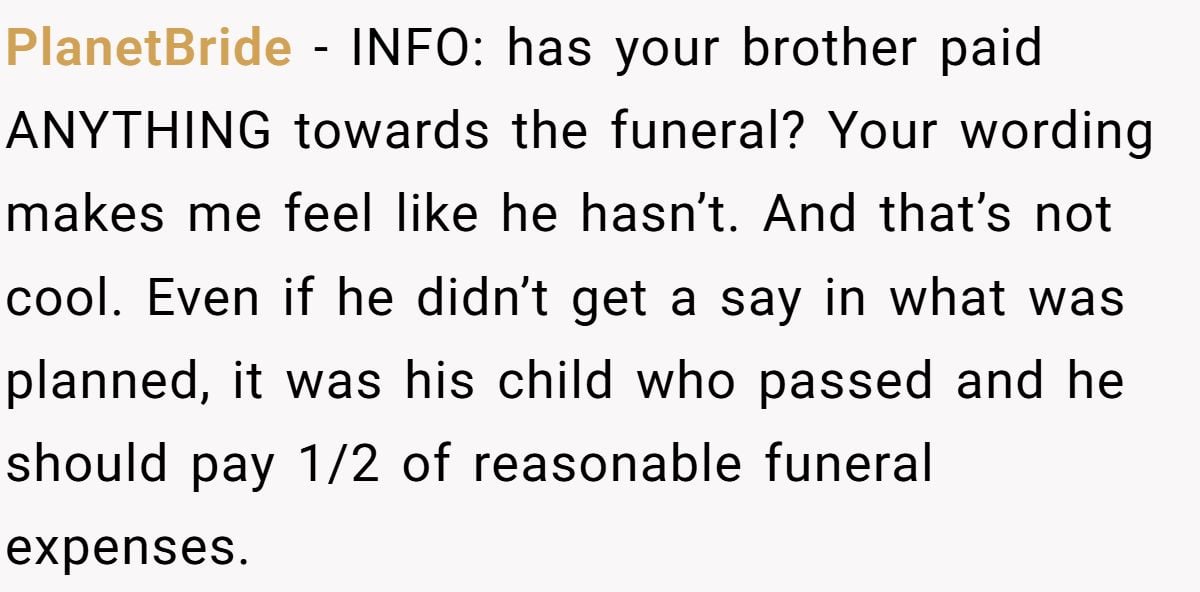
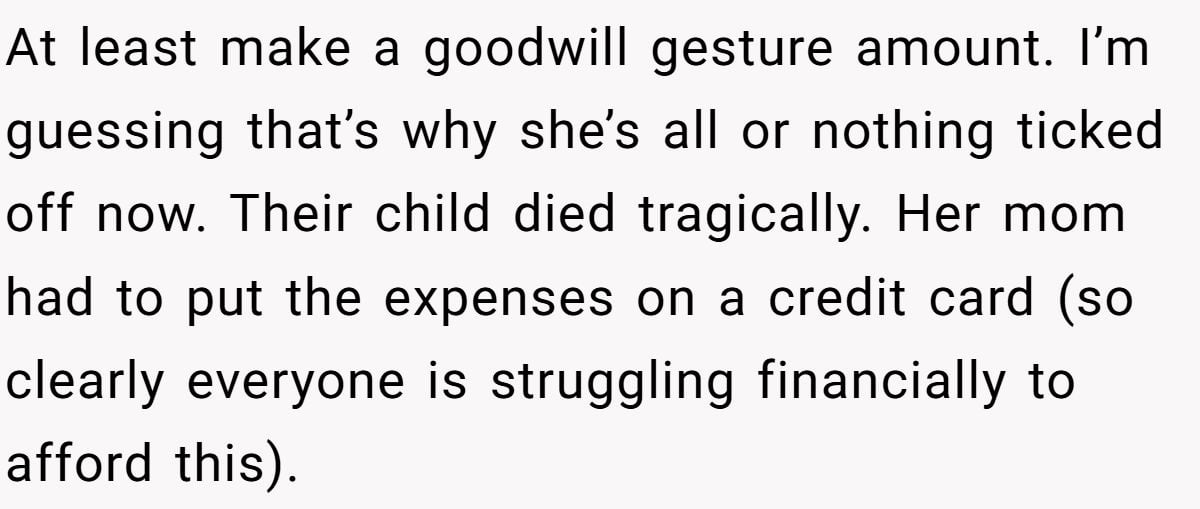
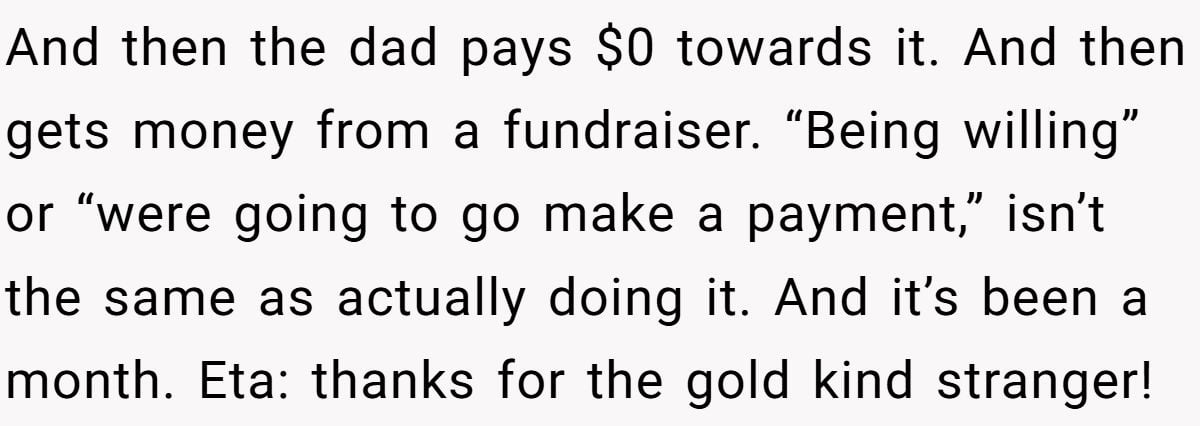
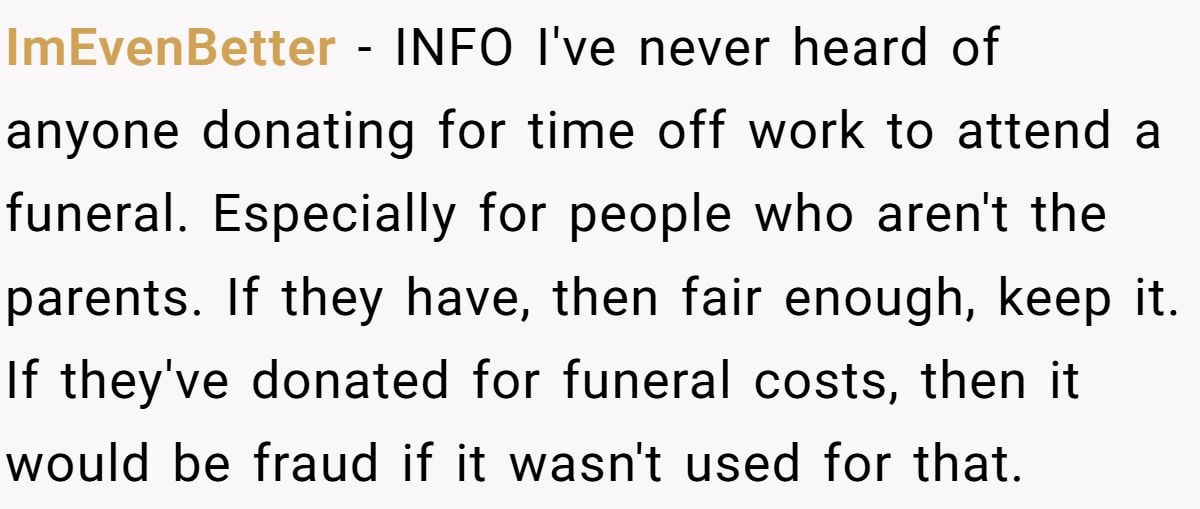
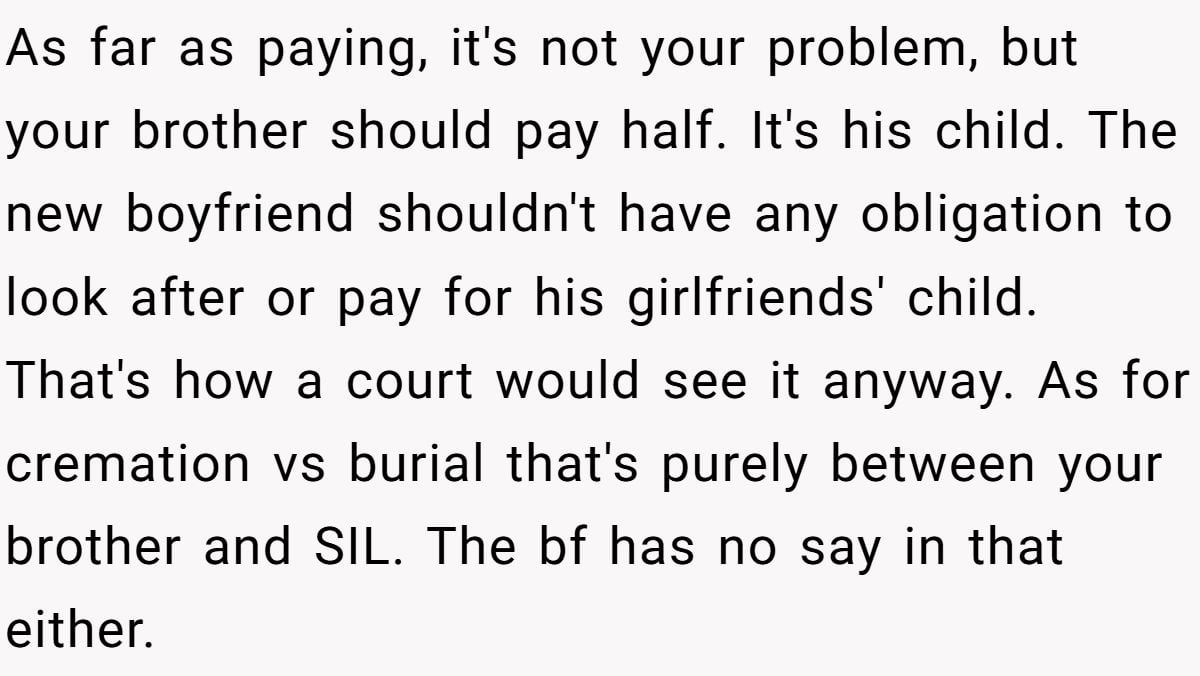


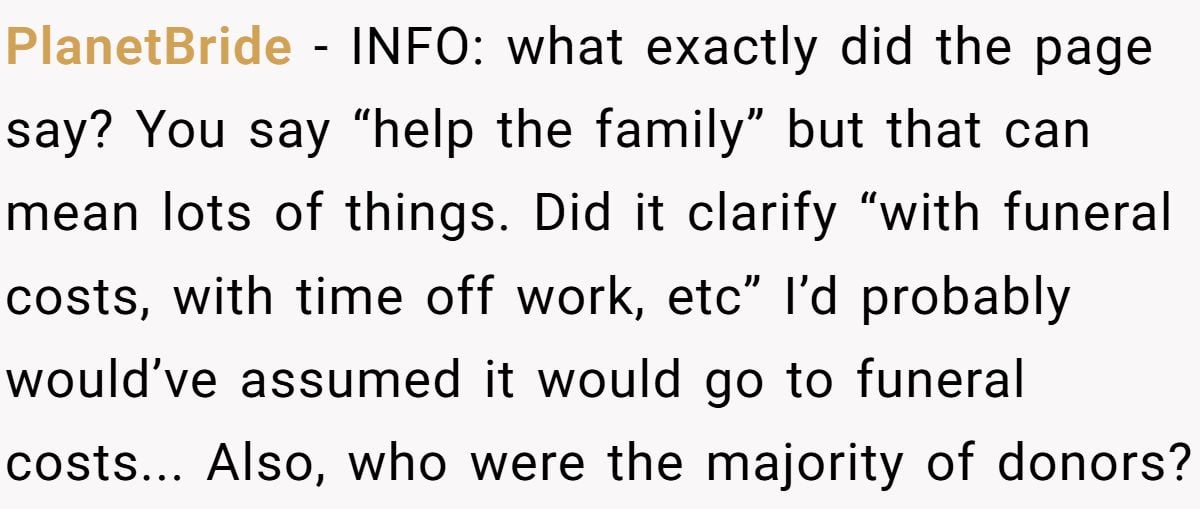
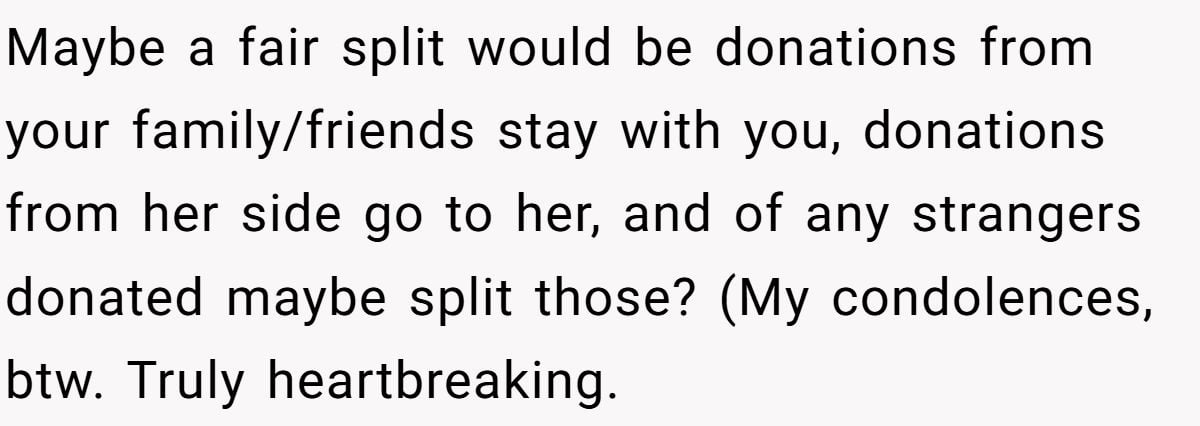














The consensus?
She was NTA (Not the Asshole).
Many users echoed a similar theme: If the father was excluded, then expecting his family to pay half was unreasonable. Especially when her new boyfriend was being publicly framed as the primary father figure.
Others pointed out that this wasn’t just emotional manipulation, it was financial exploitation, disguised under the emotional cover of a child’s death.
Reddit’s verdict wasn’t just about defending the woman. It was a larger call-out of how grief can become a justification for unfair financial pressure.
But What About the Father?
Some users did raise an important point: shouldn’t the child’s biological father contribute more, regardless of the tension?
Fair question.
But the answer depends on context, and in this case, context was everything. According to the woman, her brother had been repeatedly shut out of decisions, ignored when he asked for a different burial location, and barely acknowledged at the funeral.
Even in grief, contribution should reflect inclusion. If you won’t let someone in emotionally, you can’t ask them to foot the bill.
Setting Boundaries in the Middle of Pain
Dr. Boss, the grief expert quoted earlier, advises that in times like this, the healthiest thing to do is set clear, respectful boundaries.
In this case, the woman did exactly that.
She didn’t refuse to help. She offered a third. She was willing to pay, but only through the funeral home directly, to ensure the money went where it was needed. Not into a disputed personal fundraiser. Not into someone else’s hands with no accountability.
That kind of boundary-setting isn’t just smart, it’s necessary, especially when emotions are volatile and trust is broken.
Saying No Doesn’t Mean You Don’t Care
In grief, everything feels heavier. Words hurt more. Silence echoes louder. And decisions, especially financial ones, get judged more harshly.
When the woman said “We’re not paying half”, she wasn’t being cruel. She wasn’t trying to win. She was trying to draw a line that honored her family’s grief, her brother’s role as a father, and her own sense of fairness.
That’s not heartless. That’s human.
The Invisible Weight of Emotional Labor
Let’s talk about something that rarely gets said out loud: the emotional labor of navigating conflict in a grieving family.
This woman wasn’t just dealing with loss. She was carrying the emotional load of her brother, who had been silenced. She was absorbing the rage and pain of an ex-SIL who had spun the situation to serve her own version of events. And she had to manage her own sorrow, too.
In situations like these, someone always ends up being “the bad guy” for speaking up.
And more often than not, it’s the person trying to protect what’s right, not what’s easy.
The Right Way to Help (Without Getting Burned)
Here’s what this woman did right:
- She didn’t make it about revenge or pettiness.
- She offered financial support with conditions that ensured transparency.
- She kept her stance clear, even when accused of being heartless or fraudulent.
And she did all of that while still grieving a child who mattered deeply to her and her family.
That’s not just reasonable. That’s admirable.
A Lesson for All of Us
Here’s the hard truth: when someone passes, family conflict doesn’t magically disappear. In fact, it often gets worse.
Funerals bring out every unresolved wound. Every buried resentment. Every unspoken grudge. And when money enters the picture, the fuse is already lit.
The best thing you can do, like this woman did, is to stay grounded in facts, boundaries, and basic fairness.
Because in grief, fairness is often the first thing to get thrown out the window.
So… Was She the Asshole?
Let’s go back to the original question:
“AITA for telling my ex-SIL we shouldn’t have to pay half of her child’s funeral costs?”
Given everything we’ve seen, the exclusion of the father, the power play over the obituary, the demand for full payment plus all fundraiser proceeds, and the fraud accusation, it’s hard to see her as anything but someone caught in the crossfire.
Not the villain.
Not the asshole.
Just someone doing her best in a terrible situation.
What Would You Have Done?
If you’ve ever lost someone and had to deal with complicated family dynamics, you know how raw this can feel.
Have you been in a similar position, asked to pay, to smooth things over, to make peace when the other side refused to meet you halfway?
These moments test who we are. They ask us to stand up for people who’ve been silenced. To protect the dignity of those who are grieving differently. To choose clarity over chaos.
This Wasn’t Just About a Funeral
At its core, this wasn’t a story about funeral costs.
It was a story about grief weaponized. About a family pushed aside. About a woman trying to do right by her brother, while honoring the life of a little girl they didn’t get the chance to fully grieve.
It was about setting limits in a moment that had already taken so much.
And maybe most of all, it was about saying: “We matter too.”
What This Story Teaches Us
Here’s what we can all take away from this emotional rollercoaster:
- You can set financial boundaries and still care deeply.
- Exclusion comes with consequences, emotional and practical.
- Fairness isn’t just about money, it’s about respect.
- When in doubt, pay the funeral home directly. Keep things transparent.
And most importantly?
Grief doesn’t give someone the right to rewrite reality or demand blind obedience.
What Would You Have Done?
We’ve all seen family dynamics play out in painful ways, especially around loss. What’s your take?
Was she right to stand her ground?
Have you faced a similar guilt trip masked as a “request for help”?
Do you think funeral expenses should be tied to who had the most say in the planning?
This isn’t just one woman’s story, it’s a conversation about boundaries, fairness, and what we owe one another in the worst moments of our lives.
Share Your Story on AITAH.app
If you’ve ever been caught between grief and obligation, you’re not alone. AITAH.app is where thousands of people just like you share their experiences, dilemmas, and verdicts, no matter how messy or complex.
✅ Submit your own “AITA?” moment
✅ Get real community feedback, NTA, YTA, ESH, NAH, INFO
✅ Read raw, relatable stories that prove you’re not the only one asking: Was I wrong for saying no?
Join the conversation. Your story matters.
